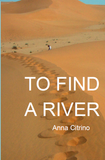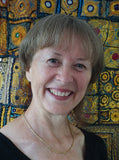At first glance, Anna Citrino’s new chapbook could seem to revolve around the question: “What is it to be a woman.” However, her poems contain more universal themes from generosity and jealousy to humanities brilliance, such as in the poem: At the Galleria Borghese, Bernini’s Vision: “…This isn’t a about perfection. /It’s about how dreams run across the earth/like gods. Once a man carved and turned them/ into life. To see them is to find a name for light. “ Through her luminous poems, Citrino’s work takes us through ancient stories like that of Sarah and Abraham, to personal ones about her mother, to universal ones about caves where our mutual ancestors came from, touching the hand of the creator. Her travels have captured small and magnificent moments of women being nurturers, like in “Stuffed” to the questions of fertility, or of her complex maternal relationship in the line, “…I am the small pebble in her palm.” To Find a River, is a jewel that takes us on a journey of the self, finding out who we are as we place our existence up against life’s complicated stories and open questions.
Robin Lysne, Ph.D. Author, Artist and publisher of Blue Bone Books, and seven titles including; Ceremonies from the Heart, for Children, Adults and the Earth and Mosaic, New and Collected Poems. She lives in Santa Cruz, CA.
"There's a space inside me" says poet Anna Citrino and these poems launch us into its multi-generational exploration that extends from biological to cosmic, from heart to soul, from answers to deeper questions, from rock to water. Perhaps, praise alone for this luminous collection won't convince you to read it, but if you pick up the book you'll feel it soar of its own will, and you'll consider yourself amply rewarded to have done so.
Sarah Cortez, Poet, Essayist, President & Founder, Catholic Literary Arts
In To Find a River, Anna Citrino offers tastes, sights, feelings, and fragrances harvested from a well-examined life. Here are poems of women viewed from diverse angles; portraits of relationships; statements—“we construct utopias for the self” or “not all things flat remain without dimension”—that are as enigmatic as koans. In these 16 poems, mothers, pagan goddesses, mythical beings, unborn children, and Biblical figures wander in a careful light, and address the reader from unexpected vantage points. You will want to be better acquainted with the strangers in these poems, and the questions Citrino poses, like “what does it mean to touch one’s dream and live?” will linger with you after you turn the final page.
Annie Stenzel, author of The First Home Air After Absence.
The heart of Anna Citrino’s To Find a River beats with longing—how saturated it is! She takes us with her as she moves through inquiries of goddesses and God, of art, of nature, even of desire itself; yet nothing is postured here, nothing self-important. She’s very clear that this isn’t just about her, that it’s about all of us: “I live in an apartment building / with three million others,” she tells us; and, later, the changes begin: “Earth becomes flesh—the dune’s round hip-curved turn,” a magical line which brings immediately to mind John Muir’s: “When we try to pick out anything by itself, we find it hitched to everything else in the universe.” “Plants suckle on stone breasts,” she reminds us. “Even stones / can speak of water.” But also, “I want to break open the twilight in me.” “Desire fills the sky.” Citrino’s penetrating, lyrical investigation is a reminder that, at our core, we are desire, that we are “reaching to be named.” This collection shines; in the very best way, by example, she sheds light on us. I name her Star. -–
Renée Ashley, author of Minglements: Prose on Poetry and Life
________________
Anna Citrino grew up in San Diego County and taught abroad in international schools in the countries of Turkey, Kuwait, Singapore, Saudi Arabia, India and the United Kingdom. Her current home is Soquel, California. A graduate of the Bread Loaf School of English in Vermont, Ms. Citrino's work has appeared in various literary journals including, The Adirondack Review, Canary, Evening Street Review, Paterson Literary Review, phren-z, and Spillway, among other publications. She is the chapbook author of Saudade. Her full-length book, A Space Between is forthcoming in December 2019 with Bordighera Press. You can read more of Anna's writing at annacitrino.com.
_________________
Hagar's Lament
I was Sarah's handmaid.
Every day while we cooked and wove,
I watched her stare at the desert's flat line.
In my land, no plant grows without the Nile.
Not one.
There is no Nile here.
I did not ask for Abraham's tenderness.
But I thirsted for it.
I had no husband to share my bed.
Didn't Sarah know I was like her?
Abraham's God promised him a child.
For a long time his God didn't say how
he would get him a child
and Sarah was barren.
I didn’t ask to be like her: empty.
She had to bear that curse.
The words fell from Sarah's lips like a weight.
"Go in to her," she told Abraham
and he did.
When I laid back in his rocking arms
and held my body open to his darkness,
I felt my own emptiness
blossom into light.
My Ishmael rose from the starving thread
of Sarah's stony life like a flooding stream.
My body broke Sarah's.
I made her silence shriek.
When she bore Isaac in her withered age,
like a shriveled fruit, she cut open her emptiness
and thrust it into me.
"Abraham, I won't have the son of this maid
be an heir with my son."
Her words flew like flint.
Cast from her house, Ishmael and I
wander the desert now.
No water left, no bread.
Cracked soil, parched earth
curling up like scabs on barren sand—
where can we go without family,
when we're nothing but foreigners
and not even slaves?
Our mouths are sand,
our bodies rock.
There he lies now
under the bush where I put him,
waiting.
I hear him call
but can’t answer.
I can’t watch him.
I cry out to Abraham's God
but he does not hear.
Our voice is wind.
Our silence, the jackal's cry.




